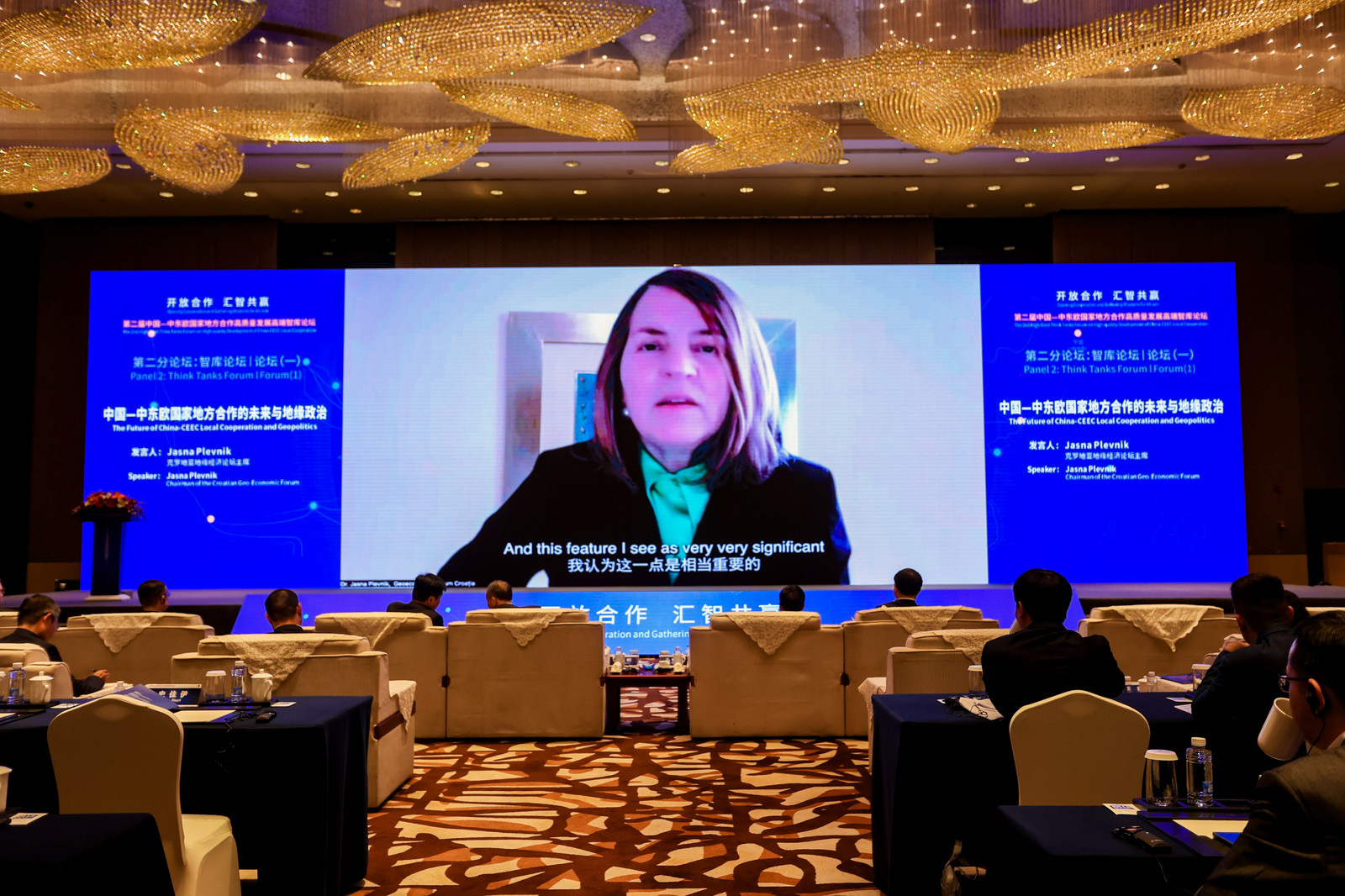Dr. Jasna Plevnik: The geopolitical perspective has shown a potential to expand towards China-CEECs at all levels
- Details
The West is trying to redefine its cooperation with China by changing the very essence of the term „cooperation“

Jasna Plevnik:„We all share a view that China- CEEC cooperation has become an advantage in China and Central East European countries relations".
The President of the Geoeconomic Forum Croatia Jasna Plevnik's speech:
In the past ten years, the cooperation has been also recognized as a part of China-EU diplomacy and part of the BRI.
However, the cooperation is still very young and must be engaged in careful consideration about its future constantly questioning how it will continue its progress by always protecting nature and exploring where new opportunities and challenges for the cooperation are.
These questions have been discussed by the China-CEEC Think Tanks Network many times.
Like Ningbo City, the Mechanism's forte is growing economic cooperation that blends local with global, enterprise with, culture and education, or reduces and simplified customs barriers.
The China-CEEC has invested a lot in people. As Professor Liu Zuokui stressed the cooperation has established, various, cultural, and educational institutions and China hosted more than 5,500 students from the CEE countries and vice versa.
In general, for the China- CEEC cooperation the world should operate as an interconnected system in which both rich and poor countries benefit. This is the win-win principle that we have talked about many times. The cooperation follows whether the country is small or large, and how the cooperation will become more symmetrical and balanced in the next decade.
A few years ago, most politicians and citizens in Europe and China considered economic cooperation and interdependence as rather ordinary things now the situation has changed in Europe.
We are witnessing a high rise of geopolitical primacy over the economy in international relations and attempts of the West to redefine cooperation" with China launching new political ideas like „decoupling" or „di-risking " which are contrary to the very idea of cooperation.
If those ideas prevailed it would make China and Europe's cooperation more fragile, partial, and narrow not just economically.
Last year, 88 percent of all Chinese investments in Europe went into four countries: Britain, France, Germany, and Hungary, which is significant within China-CEEC. All investments were in the greenfield by Chinese electric vehicle battery makers. However, Chinese investments in Europe were lower in 2022, by 22 percent from the year before. That data could be also explained as an answer to geopolitical trends in international relations.
China has called the EU's leadership that their relations are not defined by a third party. However, it appears the EU even has a problem with reaching autonomy in shaping its narrative about China and the world. The newest Washington political campaign on China is focusing on the word "di-risking" explaining it as a more suitable approach to future relations with China than the notion of "decoupling". The EU has turned to "di-risking", which is a word of vague meaning, very fast. So, it is possible that in a new Brussels strategic approach to ties with China, which should be presented soon, "di-risk", could be a catchphrase.
The China-CEEC Think Tanks Network is focused to help local cooperation by exploring new ways for China-CEEC relations and how it could answer those new problems which sometimes go beyond what the business community can solve.
The shadow of geopolitics is long, and it seems difficult to get out of it soon
That is why the local cooperation within China-CEEC should be deeply researched from that geopolitical perspective which has shown a potential to expand towards China-CEECs at all levels. Geopolitical issues move fast, and always surprises me how resilient geopolitics was and is. I hope one day geopolitics will perish and then we will be able to talk about the new world order.
There may be a trend toward pessimism on what can be done in the current era of unprecedented instability in Europe, but there is a way forward.
First, the future of China-CEEC cooperation depends on how the EU and China would answer to geopolitical trends in international relations caused by the war in Ukraine. Chinese diplomacy for peace in Ukraine is a significant support to peace in Europe and indirectly to China-CEEC's future.
Second, the future of China- CEEC cooperation also strongly depends on its ability to find its strongest structure, or side to deal with current challenges, and that structure is in my opinion China-CEECs multilateralism that has been built by many efforts of all partners.
Multilateral addressing of geopolitical challenges means the China-CEEC should act together in groups which will be more effective than acting only bilaterally.
Strengthening of multilateralism, unity, and solidarity will make decisions made by the China-CEEC mechanism even stronger and sustainable in the long term. That's why I see this approach as important when talking about China-CEEC's future in now very unbalanced international environment.